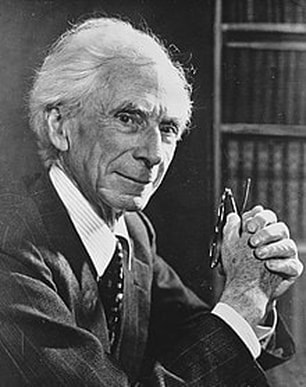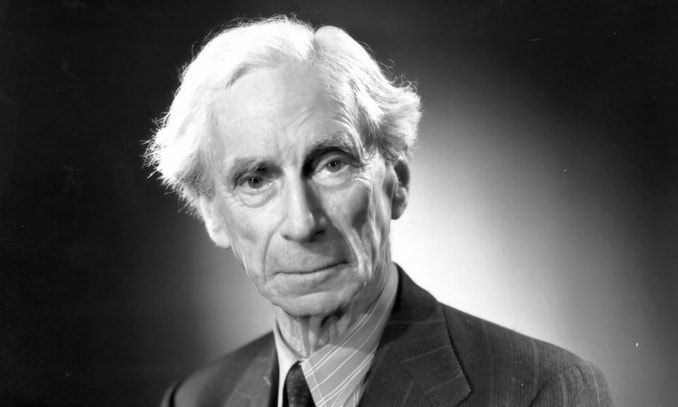3. 'Lenin, Trotsky and Gorky'This chapter is full of personal impressions of Lenin, Trotsky and Gorky. It is really very subjective, more so than many other opinions in this book, so I will pass it by after giving just a few examples. Of Lenin, Russell says, "I have never met a personage so destitute of self-importance." Lenin thought it would be difficult to build socialism with a majority population of peasants (little did he know). He told Russell that the world revolution was needed before any real achievement could happen. Of Trotsky, Russell says the Russians don't regard him at all as equal to Lenin but he impressed Russell more as to "intelligence and personality" but he had only "a very superficial impression" of the man. He had "admirable wavy hair" and appeared vain. He brought to mind a comparison with Napoleon! Gorky was ill when Russell interviewed him. "He supports the government," Russell wrote, “as I should do, if I were a Russian-- not because he thinks it faultless, but because the possible alternatives are worse." If Russell really thinks that, then he, as a Leibniz scholar, should have recognized that the Bolsheviks were the best of all possible Russian governments and thus mitigated some of his criticisms since he could see the Bolsheviks were doing the best they could. He should have at least made constructive criticisms of the faults instead of comparing them to his ideal of Britain since 1688 and suggesting incommensurable historic parallels. Nevertheless, it is quite an admission for a supposed anti-communist to say that Lenin’s government was the best possible (or least worse) government for Russia. Now for a more substantive chapter. 4. 'Communism and the Soviet Constitution'Russell wanted to study and compare the Soviet system, set up by the Constitution, with the Parliamentary system but could not as he found the Soviets "moribund." The All Russian Soviet , the legal supreme body, hardly ever met and had already become a rubber stamp for the CP. This was due to the fact that the Western blockade and the Civil War had reduced the country to the verge of collapse and the Bolsheviks could only hold out by extreme measures. The idea was first the government had to survive and after peace was established there could be a return to more democratic measures. Russell was aware of the fact that the peasants were hostile to the Bolshevik regime. To feed the cities it was necessary to take food from the peasants and this was paid for by essentially worthless paper money which the peasants could not really spend. Nevertheless, Russell thought the peasants "never better off" and their dislike of the Bolsheviks seemed unwarranted. He saw no "under fed" peasants and the big landlords' property had been confiscated for the benefit of the peasants. The peasants were very ignorant, knowing little beyond the confines of their villages. Knowing nothing of the Civil War or blockade "they cannot understand why the government is unable to give them the clothes and agricultural implements that they need." Russell saw the CP in Russia ('the bureaucracy") divided into three parts. First, the old Bolsheviks, "tested by years of persecution", who have the most important positions. They are upset by the backwardness and hostility of the peasants and by the fact their ideals have to be postponed awaiting better material conditions. Second, the second rank of "arrivistes" who have the second level positions. They benefit from the fact that the Bolsheviks are in power (the police, informers, secret agents, etc.,) From their ranks come the members of the Extraordinary Commission [i.e., the Cheka or,in 1920, All Russian Extraordinary Commission for Combating Counter-Revolution, Profiteering and Corruption). This was a violent revolution and the White Guards, the pro Tsarist side in the Civil War, had unleashed the "White Terror" in areas it controlled and the Bolsheviks, fighting fire with fire, unleashed the "Red Terror" against their perceived enemies. Needless to say, many untoward actions were taken by both sides. Lenin addressed these issues of democracy and dictatorship in a speech he gave in 1920. "[In] the era of capitalism, when the masses of the workers are subjected to constant exploitation and cannot develop their human capacities, the most characteristic feature of working-class political parties is that they can involve only a minority of their class. A political party can comprise only a minority of a class, in the same way as the really class-conscious workers in any capitalist society constitute only a minority of all workers. We are therefore obliged to recognise that it is only this class-conscious minority that can direct and lead the broad masses of the workers.... What is this organized minority? If this minority is really class-conscious, if it is able to lead the masses, if it is able to reply to every question that appears on the order of the day, then it is a party in reality." And because of the dire situation in Russia it was really a small group of leaders at the top who actually ruled Russia. Looking back from the 21st century, this top down centralism appears to have remained the case to the end of the Soviet Union and was, and is, a problem with some CPs to this day. Now for the third group in Russell's view. These were people who supported the government not because they were fervent communists but because the communists were in power and they could benefit from serving the communists-- either out of motives of patriotism or self interest (or both). These people were of the same type as American businessmen (being motivated to advance themselves and take advantage of situations) and Russell "supposes" that if peace comes this group will help in the industrialization of Russia making it "a rival of the United States." The Russian workers in 1920, Russel said, were lacking in the habits of "industry and honesty" and the "harsh discipline" of the Bolsheviks will allow Russia to become "one of the foremost industrial countries." This attempt will be made in the 1930s in earnest. Coming up, 'The Failure of Russian Industry' AuthorThomas Riggins is a retired philosophy teacher (NYU, The New School of Social Research, among others) who received a PhD from the CUNY Graduate Center (1983). He has been active in the civil rights and peace movements since the 1960s when he was chairman of the Young People's Socialist League at Florida State University and also worked for CORE in voter registration in north Florida (Leon County). He has written for many online publications such as People's World and Political Affairs where he was an associate editor. He also served on the board of the Bertrand Russell Society and was president of the Corliss Lamont chapter in New York City of the American Humanist Association.
0 Comments
Leave a Reply. |
Details
Archives
May 2022
Categories |


 RSS Feed
RSS Feed